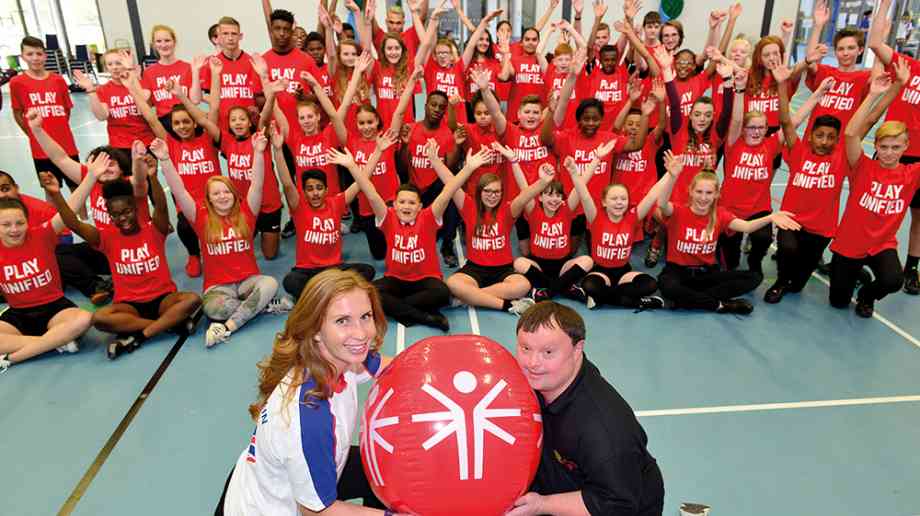
Intellectual disabilities: breaking down barriers in schools
Karen Wallin, CEO of Special Olympics GB, discusses the challenges facing young people with intellectual disabilities, and provides insight into Play Unified – a campaign using sport to change perceptions of those with intellectual disabilities in schools across the UK.
For a young person living with an intellectual disability (ID) in the UK today, there are still a number of challenges which have to be confronted.
One issue is raising awareness of what ID actually is – the most common disability in the UK – it ranges from Down’s syndrome to some types of autism. There are currently more than 1.4 million people in Great Britain with ID and this is predicted to grow by 14 per cent by 2021.
Unfortunately people living with ID tend to be more susceptible to bullying, with eight in 10 bullied at some stage in life. Moreover, when it comes to physical health, one in three people with ID are classed as obese and over 80 per cent of adults with ID do not achieve daily recommended levels of physical activity. Physical and mental health are intrinsically entwined and physical activity can act as means to help people develop the confidence and social skills to flourish in life.
A central tenet of our campaign is that if those with intellectual disabilities are denied access to physical activity, it is to their detriment and to the detriment of wider society as well. We identified schools as essential environments for tackling these wider societal challenges; they act as a microcosm of broader society and represent a key stage in life for shaping and developing how one looks at the world.
Tolerance on and off the playing field
Part of a global movement, the Play Unified campaign came to the UK earlier this year as a partnership project between Special Olympics Great Britain and national charity the Youth Sport Trust.
The aim of Play Unified is to bring young people with and without intellectual disabilities together, both on and off the field of play.
There is a wealth of research demonstrating the positive benefits of sport. As recently outlined by the Sport and Recreation Alliance: “Sport can improve physical health and so reduce the risk of obesity, heart disease, cancer and other illnesses, treat depression, stress and anxiety, enhance social cohesion, improve educational attainment and strengthen employment opportunities.”
For people with ID specifically, sports participation and physical activity have been shown to improve levels of physical health and well-being, improve self-confidence, self-esteem, general mood and quality of life overall.
Playing sport together allows young people to learn from each other and fosters the virtues of inclusion, tolerance and respect. Positioned within the Young Ambassador movement, people with and without intellectual disabilities, who have been selected for their leadership qualities, have gathered at the various Play Unified Youth Summits to drive the campaign and learn how to become leaders in their schools. Play Unified’s Young Ambassadors are encouraged and supported to develop leadership skills which they can put into practice in their schools and communities because schools are key hubs for shaping the attitudes and values of the future generation. Our two‑year campaign will engage 200 schools, impact on 18,000 young people, up-skill 200 teachers and work with 400 Young Ambassadors across the country. Ultimately, our ambition is that the campaign will help create a ‘unified generation’.
Is a unified generation viable?
Play Unified is inspired by a simple principle: training together and playing together is a quick path to understanding, acceptance and friendship.
This was brought to life through a series of Play Unified Youth Summits across the country bringing together young people, teachers and athletes – they have acted as forums for inspiration and learning. The summits have spanned Liverpool, Exeter, Glasgow and London among other locations and will continue impacting regions throughout the UK this academic year.
The summits have educated, motivated and empowered young people to create positive change, promote inclusion and provide more opportunities for young people to take part in sport.
Early indications from our research into the impact of Play Unified so far are extremely encouraging. Nine in 10 attendees said that they had a more favourable view of people with intellectual disabilities following the events. While, four in five said that the summits left them feeling better about themselves in general. Over two-thirds felt more upbeat about the future, with eight in 10 having increased confidence to go back to school and lead a Play Unified project.
However, the real success is that an overwhelming majority of nine out of 10 of attendees, both with and without intellectual disabilities, said that they felt more positive about their abilities following the Play Unified summits.
The campaign is also resonating with the public. There is a motivational video to accompany the campaign in the UK, starring young people from across the country alongside successful sports stars. It highlights the barriers faced by young people with intellectual disabilities – and the power of sport to change that.
Since its premiere in early July, the video has been viewed more than 1,500 times, and survey results show its impact is clear. After watching, three-quarters of viewers surveyed said that they wanted to do something to make society fairer for people with intellectual disabilities. Encouragingly, seven in 10 people also said the video made them feel differently about what people with intellectual disabilities can achieve.
While these results are promising, we will not be resting on our laurels. We are fully aware that further barriers need to be broken before we have a truly unified generation.
Teachers can play a pivotal role in driving positive change in schools, whether through Play Unified or independently. The benefits of special and mainstream schools coming together can be profound for all involved – and is a wonderful opportunity to promote friendship and inclusion.
We are confident that a unified generation is much more than a pipe dream – an eminently attainable aspiration.
Further information
www.specialolympicsgb.org.uk/play-unified
Latest News
19/12/2025 - 09:54
The Education Committee has expanded its ongoing inquiry into the early years sector to examine how safeguarding can be strengthened in early years settings.
18/12/2025 - 09:25
The UK will be rejoining the Erasmus programme in 2027, following a package of agreements with the EU.
17/12/2025 - 09:31
Ofqual has fined exam board Pearson more than £2 million in total for serious breaches in three separate cases between 2019 and 2023 which collectively affected tens of thousands of students.
16/12/2025 - 09:19
The average funding rates will increase by 4.3% for under 2s, and by almost 5% for 3-and-4-year-olds.
15/12/2025 - 10:30
Local colleges are set to receive £570 million in government funding to expand training facilities in areas such as construction and engineering.







